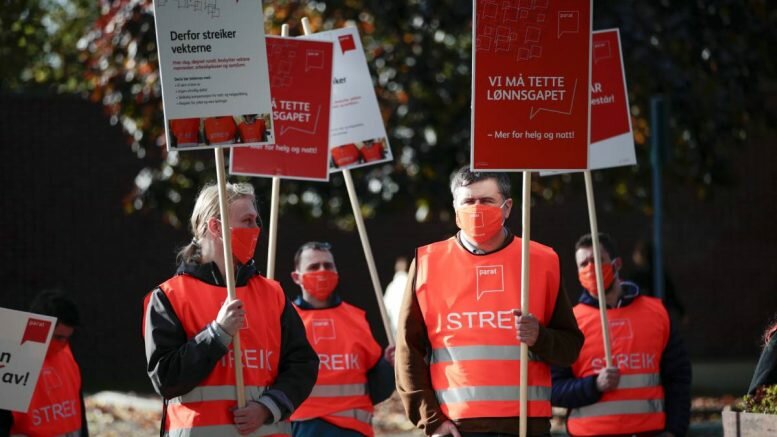Unions and worker rights in Norway are consistently pressing issues, with topics ranging from employees striking for higher wages, to backlash over companies refusing workers the right to organize.
“Almost 1,400 Norwegian meat workers threaten strike if mediation collapses“
“More Norwegian unions join Wizz Air boycott“
“Norway’s security guards threaten to escalate strike“
“Norwegian workers in breweries and mineral water factories prepare to go on strike“
“The oil workers’ strike could stop a quarter of production on the Norwegian shelf“
“Norway prepares for strike in aviation sector“
“Doctors’ strike underway, rapid escalation expected“
“Hotel employees’ strike averted, parties agree on deal“
“Bus union members vote in favor of deal – there will be no new bus driver strike in Norway“
“Norwegian nurses reject offer from this year’s wage negotiations, risk of strike increases“
“Kindergarten strike in Oslo averted“
These are just a few, of many, Norway Today headlines related to unions and worker rights in Norway…
… Over the past month.
Clearly, in this country, the ability for workers to organize and negotiate is crucial. But what does unionizing in Norway actually entail? What rights do workers have in the country?
We’re bringing you the answers.
Working in Norway 101
Norway’s Working Environment Act (in Norwegian, Arbeidsmiljøloven) governs worker rights in Norway. This is the principal Norwegian labor law. For workers in the government sector, however, the Civil Servant Act applies.
Labor laws in Norway provide regulations both in terms of individual employees and their contracts, and unions and their collective agreements.
Norwegian government bodies responsible for worker rights include the Ministry of Labor and Social Affairs and the Norwegian Labor and Welfare Administration.
Here’s an overview of worker rights in Norway.
Being fired
If an employee is fired, their employer must present objectively justifiable reasons for the dismissal in writing. Downsizing is generally allowed as a legitimate reason, but it must also be justified.
A 14-day notice has to be given by the employer to the employee. Formal warnings before dismissal are not required, however.
Employment contracts
Any form of employment requires a written contract in Norway.
This applies regardless of the duration of employment, for both full-time and part-time work, and for both permanent and temporary positions.
Contracts must include information such as the identities of employees and employers, the place of work, the employee’s title, the starting date, the employment duration, wages, working hours, and vacation allowances.
Employers are responsible for preparing written contracts.
Holidays and vacation
Norway has a so-called Holiday Act (in Norwegian, Ferieloven) which lays out regulations regarding time off for public holidays.
Workers under the age of 60 in Norway are entitled to at least four weeks (28 days) of paid vacation, though this number can be even higher depending on specific union/employee-employer agreements. Workers over the age of 60 are allowed at least five weeks (35 days) of paid vacation.
If an employee is part of a trade union, their employer can be obligated to discuss fixed vacation days with the worker beforehand. Commonly fixed vacation periods include the summer high season and winter holidays. For example, 7 days could be fixed between Christmas Eve and New Year’s Day, and 21 days during July or August.
If the two parties can’t reach an agreement, the employer can be allowed to decide on the fixed vacation days, within certain parameters outlined by the law.
Parental leave

Parents in Norway are entitled to parental leave if they have been employed for six months prior to the birth or adoption of a child.
49 weeks of parental (just over 11 months) are allowed with full pay. 59 weeks (a little over 1 year) are given with 80% pay. Parents of twins receive 17 extra weeks with full pay, or 21 weeks ay 80% pay.
In two-parent families, parents share the allowed amounts of time off. Mothers are given the first 15 weeks, and after that, each parent is entitled to 16-26 weeks.
Pensions
Those who have been a member of Norway’s National Insurance Scheme for over 12 months are entitled to pensions.
Pensions are given to those who have lived and worked in Norway legally.
People over the age of 62 can begin accessing their retirement pensions.
Safety in the workplace
Applicable health and safety training is required for employees and it must be secured from the side of employers.
Detailed workplace health and safety regulations are laid out in Norwegian law per industry.
Sick leave
Employees must be a part of the National Insurance Scheme to receive paid sick leave.
No medical documentation is required for illnesses that last three consecutive days or less.
For longer periods, employees must present medical documentation to receive 100% of their pensionable income while on sick leave. The amount is paid by employers during the first 16 days of sick leave. In longer cases, the National Insurance Scheme takes over payment.
Parents are also entitled to pay during work absences due to caring for a sick child.
At least 10 days are granted to parents with one to two children. A minimum of 15 days is given to parents with over two children. Single parents receive at least 20 days if they have one to two children, and 30 days if they have over two children. These rules can apply up until the youngest child turns 13 years old.
Working hours
The Working Environment Act defines regular working time limits as 40 hours per 7 days, and 9 hours per 24 hours.
The law also allows for flexible working hours to be agreed upon between union/employee and employer. This applies particularly in special cases regarding health or welfare reasons.
Employees over the age of 60 have a right to reduced working hours.
Any overtime work has to be compensated accordingly. The minimal amount of overtime pay is an increase of 40% of a regular salary.
Unions
Unions in Norway are so powerful, they deserve their own section here.
Workers in Norway have the legal right to unionize – but private companies aren’t legally obligated to negotiate with unions. Collective agreements are, therefore, reached on a voluntary basis.
However, if unions are ignored, or if they’re unhappy with offered terms, they can take a number of legal measures against companies. These are most often boycotts and strikes.
So, while collective agreements are officially voluntary, unions can apply a high amount of pressure to companies in order to form and modify them.
On behalf of their members, unions in Norway can negotiate everything from higher salaries, across legal employment disputes, to better working conditions.
Unions can act on local and/or national levels.
Most smaller unions in Norway are affiliated with larger union confederations. The country has a handful of giant union confederations that handle collective bargaining.
Here are some of Norway’s union federations:
- The Confederation of Norwegian Trade Unions (LO) – considered the largest and most influential
- The Confederation of Vocational Unions (YS)
- The Norwegian United Federation of Trade Unions (Fellesforbundet)
- The Confederation of Unions for Professionals (UNIO)
- The Federation of Norwegian Professional Associations (Akademikerne)
Union members pay annual membership fees which can be tax-deductible.
Wages
This may come as a surprise, but Norway doesn’t have federally mandated minimum wage requirements.
Instead, unions negotiate salaries for employees by industry. So, pay levels vary across sectors. Keep in mind that wages still aren’t universal across industries; they vary by skill level and age.
The following industries have attained minimum rates of pay:
- Agriculture and horticulture
- Cleaning
- Construction
- Electricians
- Fish processing
- Transportation
- Maritime construction
- Hotels, restaurants, and catering
Here’s an industry example of minimum wages. Let’s look at agriculture and horticulture employees.
The following wages apply in this industry from June 1, 2019.
Vacation and harvest workers:
- Workers under 18 years of age: NOK 103.15
- Over 18 years of age – employed for up to 12 weeks: NOK 123.15
- Over 18 years of age – employed 12 to 24 weeks (3-6 months): NOK 128.65
- Over 18 years of age – employed for more than 6: NOK 143.05
Permanently employed workers:
- Unskilled workers: NOK 143.05
- Workers under 18 years of age: NOK 112.65
- Supplement for skilled workers: NOK 11.75
Find all minimum wage information here as confirmed by the government of Norway.
For more information, a Norway salary database can be found at Statistics Norway, also known as SSB.
Does Norway’s employment system work for its workers?
By all accounts, it aims to.
Laws exist to prevent discrimination, unions fight for higher wages to cover the high costs of living in Norway, and firing a worker is quite expensive – and so, might happen more rarely than in other countries.
What do you think about unions and worker rights in Norway – could they be improved or are they some of the world’s best?
Let us know in the comments!
Source: Norway Today




Leave a comment